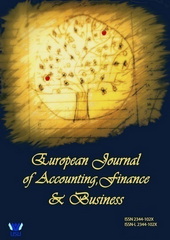|

ISSN: 2344 - 102X
ISSN-L: 2344 - 102X
Our journal is currently indexed in the following databases:
|
| |
Article from Volume 11, Number 2, Year 2023| SUSTAINABILITY IN TURBULENT BUSINESS ENVIRONMENTS: FROM PHILOSOPHY TO PRACTICE | 
Download | | Author(s): Rozalia Kicsi, Denisa Chifan | | DOI: 10.4316/EJAFB.2023.1127 | | Abstract: Sustainability has emerged on the intellectual horizon first as a conception and then as a full concept in its own right, now challenged by the complexity and dynamism of a world shaped by transformations in technology, economic policies, industrial structures, economic theory, the knowledge needed to govern and lead, and economic issues. The concept and philosophy of sustainability has its origins in the environmental movement; long before the term was used in the context of human-nature interactions, environmentalists insisted on the imperative to understand more deeply the long-term consequences of intense human activity almost single-mindedly oriented towards the ideal of growth and development. The literature increasingly calls for a paradigm shift in terms of the multi-objective role that business organizations are embracing, with some of these objectives transcending the economic context. Over the last decades, various categories of organizations have become conscious and have increasingly accepted that they are also called upon to play a social role. In this context, sustainability is turning into one of the main business philosophies and practices in the 21st century. | | Keywords: Sustainability; Business Organization; Chaotics; Growth; Development. | References:
1. Artiach, T., Lee, D., Nelson, D., & Walker, J. (2010). The Determinants Of Corporate Sustainability Performance. Accounting & Finance, 50(1), 31–51. Https://doi.org/10.1111/j.1467-629X.2009.00315.x.
2. Barney, J. (1991). Firm Resources And Sustained Competitive Advantage. Journal Of Management, 99–120.
3. Brown, B. J., Hanson, M. E., Liverman, D. M., & Merideth, R. W. (1987). Global Sustainability: Toward Definition. Environmental Management, 11(6), 713–719. Https://doi.org/10.1007/BF01867238
4. Büyüközkan, G., & Karabulut, Y. (2018). Sustainability Performance Evaluation: Literature Review And Future Directions. Journal Of Environmental Management, 217, 253–267. Https://doi.org/10.1016/j.jenvman.2018.03.064
5. Cie?lak, I., Pawlewicz, K., & Pawlewicz, A. (2018). Sustainable Development In Polish Regions: A Shift-Share Analysis. Polish Journal Of Environmental Studies, 28(2), 565–575. Https://doi.org/10.15244/pjoes/85206
6. Drucker, P. F. (2001). The Essential Drucker: Selections From The Management Works Of Peter F. Drucker. PerfectBound.
7. Drucker, P. F. (2011). The Frontiers Of Management ((first Published In 1987)). Routledge.
8. Elkington, J. (1999). Cannibals With Forks: The Triple Bottom Line Of 21st Century Business. Capstone.
9. Figge, F., & Hahn, T. (2004). Sustainable Value Added—Measuring Corporate Contributions To Sustainability Beyond Eco-efficiency. Ecological Economics, 48(2), 173–187. Https://doi.org/10.1016/j.ecolecon.2003.08.005
10. Forrester, Jay. W. (1973). World Dynamics. Wright-Allen Press.
11. Hart, S. L., & Milstein, M. B. (2003). Creating Sustainable Value. Academy Of Management Executive, 15.
12. Hofstede, G., Hofstede, G. J., & Minkov, M. (2010). Cultures And Organizations: Software Of The Mind?; Intercultural Cooperation And Its Importance For Survival (Rev. And Expanded 3. Ed). McGraw-Hill.
13. Jones, T. M. (1995). Instrumental Stakeholder Theory: A Synthesis Of Ethics And Economics. The Academy Of Management Review, 20(2), 404. Https://doi.org/10.2307/258852
14. Jung, S., Nam, C., Yang, D.-H., & Kim, S. (2018). Does Corporate Sustainability Performance Increase Corporate Financial Performance? Focusing On The Information And Communication Technology Industry In Korea: Corporate Sustainability And Financial Performance. Sustainable Development, 26(3), 243–254. Https://doi.org/10.1002/sd.1698
15. Kicsi, R. (2023). Ipostaze Ale Sustenabilit??ii în Contextul Unui Mediu De Afaceri Turbulent: Paradigme, Controverse ?i Provoc?ri. Tez? De Abilitare. ?tefan Cel Mare University Of Suceava.
16. Kidd, C. V. (1992). The Evolution Of Sustainability. Journal Of Agricultural And Environmental Ethics, 5(1), 1–26. Https://doi.org/10.1007/BF01965413
17. Kotler, P., & Caslione, J. A. (2009). Chaotics: Management ?i Marketing în Era Turbulen?elor (S. Nistor, Trad.). Publica. (Original Work Published 2009)
18. Lourenço, I. C., Branco, M. C., Curto, J. D., & Eugénio, T. (2012). How Does The Market Value Corporate Sustainability Performance? Journal Of Business Ethics, 108(4), 417–428. Https://doi.org/10.1007/s10551-011-1102-8
19. Marshall, J. D., & Toffel, M. W. (2005). Framing The Elusive Concept Of Sustainability: A Sustainability Hierarchy. Environmental Science & Technology, 39(3), 673–682. Https://doi.org/10.1021/es040394k
20. Meadows, D. H., Meadows, D. L., & Randers, J. (1992). Beyond The Limits: Confronting Global Collapse, Envisioning A Sustainable Future. Chelsea Green Pub. Co.
21. Meadows, D. H., Meadows, D. L., Randers, J., & Behrens III, W. EW. (1972). The Limits To Growth. Universe Books.
22. Meadows, D. H., Randers, J., & Meadows, D. L. (2009). The Limits To Growth: The 30-year Update (Reprint). Earthscan.
23. Ordway, S. H. (1956). Possible Limits Of Raw-Material Consumption. În Man’s Role In Changing The Face Of The Earth (pp. 987–1009). University Of Chicago Press.
24. Porter, M. E., & Kramer, M. R. (2011). The Big Idea: Creating Shared Value. Harvard Business Review, January-February.
25. Portney, K. E. (2015). Sustainability. London, England?: The MIT Press.
26. Ruf, B. M., Muralidhar, K., Brown, R. M., Janney, J. J., & Paul, K. (2001). An Empirical Investigation Of The Relationship Between Change In Corporate Social Performance And Financial Performance: A Stakeholder Theory Perspective. Journal Of Business Ethics, 32(2), 143–156. Https://doi.org/10.1023/A:1010786912118
27. Sachs, I. (1977). Eco-Development: Meeting Human Needs. India International Centre Quarterly, 4(4), 337–350.
28. Socoliuc, M., Grosu, V., Cosmulese, G., & Kicsi, R. (2020). Determinants Of Sustainable Performance And Convergence With EU Agenda 2030: The Case Of Romanian Forest Enterprises. Polish Journal Of Environmental Studies, 29(3), 2339–2353. Https://doi.org/10.15244/pjoes/110757
29. Teece, D. J. (2007). Explicating Dynamic Capabilities: The Nature And Microfoundations Of (Sustainable) Enterprise Performance. Strategic Management Journal, 28(13), 1319–1350.
30. Thiele, L. P. (2016). Sustainability. Polity Press.
31. Toffler, A. (1973). ?ocul Viitorului. Editura Politic?.
32. Toffler, A. (1983). Al Treilea Val. Editura Politic?.
33. ?igu, G., Popescu, D., & Hornoiu, R. I. (2016). Corporate Social Responsibility – An European Approach Through The Tourism SME’s Perspectives. Amfiteatru Economic, 18(10), 16.
34. Vogt, W. (1948). Road To Survival. William Sloane Associates, Inc.
|
| | Back to journal ... |
|
|
| |
|
|
|

